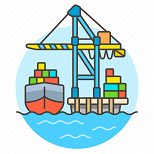Cargo loss – warehouse director’s liability
.png)
Warehousing logistics is an integral part of supply chain: it has multiple functions, namely cargo accumulation, storage and distribution, cargo processing and customs clearance, loading/discharging operations and many others.
Warehousing logistics has been developing long ago: now it grants an opportunity to upgrade processes at warehouses up to maximum level, while the range of rendered services is regularly increasing. So, it is not an exhausted list of operations set above.
Such a large and complex structure requires for hiring a team of qualified managers and experts liable for working process organization and warehouse functioning in whole.
Despite the fixed system of warehousing logistics, it faces disputable situations even right now, such as cargo damage and deterioration, incompliance of declared cargo amount with data indicated on warehousing receipt, missed deadline for performance of cargo operations etc.
Such disputes mostly arise from violation of contractual relations; therefore, warehouse as legal entity violating its obligations shall be liable. In such case, there is quite clear way to settle the dispute: claims handling – litigation – enforcement proceedings. If the guilty person voluntarily agrees on amicable dispute settlement, the conflict shall result in amicable agreement just at the initial stage of dispute settlement.
But the above method does not always apply to dispute settlement, while the arisen situation often for involvement of law enforcement bodies.
Let us highlight our recent case: there was a criminal offense in respect of violating contractual obligations.
Case plot: the Client transferred cargo (grain) to the warehouse for storage in a certain amount. In confirmation of cargo acceptance for storage, the latter issued Warehouse Receipt. When cargo shipment operations should have taken place at the Client’s request, the cargo turned out to be absent at the warehouse, while the warehouse director was unaware of the current situation and the cargo location.
Of course, it is reasonable to ask: What happened? What to do? To whom should we apply? Who is to blame? How to return cargo or to reimburse losses?
Unfortunately, warehousing logistics often faces such situations.
First of all, one should understand what happened and who should be liable for violation? With regards to our case circumstances, cargo theft obviously has taken place. So, we should understand who was involved in such offense.
Based on warehouse director’s and employees’ behavior, none was concerned of fixing case circumstances: the warehouse failed to notify law enforcement bodies on cargo theft, it neither took part in criminal investigation nor facilitated determining a guilty person.
Having studied case circumstances, we found out that all the processes at the cargo storage terminal have been carried out solely with the director’s consent and under the director’s control. So the warehouse personnel constantly reported to the terminal director about all the operations, namely: cargo acceptance for storage, accumulation, processing and preparation to discharge, transport entry to the terminal territory for the purpose of loading/discharging operation, issuing cargo documents and others. Also, the director stayed at the terminal territory 24/7 and therefore fully controlled the whole situation at the terminal.
Note: director of the legal entity shall be treated as a person bearing substantive responsibility. Grounds for bringing the director to criminal responsibility shall be actions or omissions of such persons, being treated as criminal offense in accordance with the Criminal Code of Ukraine. Criminal nature of actions or omissions shall fix elements of crime. Director may bear criminal responsibility both as a natural person and as an officer.
One should distinguish categories of criminal offense, when the legal entity shall be deemed as guilty and when the director shall be directly liable. For instance, a legal entity can be brought to criminal responsibility for such types of violations, as money laundering (legalization of profits received by criminal way); use of earnings from unlawful trade of drugs, psychotropic substances, their analogues, precursors, poisonous or potent substances, poisonous or potent medicines; bribery of an official employed by private legal entity irrespective of its legal and organization form; bribery of a public service provided; proposal, promise or unlawful profit for an official, as well as abuse of powers.
This is not an exhausted list of above crimes; the law also provides criminal responsibility of legal entities for crimes committed against public safety (in particular those related to terrorism), commitment of certain types of crimes against fundaments of national safety, against will, honor and dignity of a person, against electoral rights and freedoms, against fundaments of public safety, as well against peace, human security and international legal order and many others.
If criminal responsibility of legal entities is clear, let us deal with criminal responsibility of natural persons for crime commitment in the form of abuse of powers. Let us study criminal responsibility of a natural person based on our recent case, as described above.
With regards to all case circumstances, law enforcement officers qualified actions committed by the terminal director as a crime stipulated by Part 5 Article 191 of the Criminal Code of Ukraine, i.e. misappropriation, waste of property or its possession by abuse of powers in particularly large amounts.
Type of criminal offense declared to the terminal director was misappropriation and waste of property by abuse of powers in particularly large amounts.
Practice shows that the most widespread types of criminal offenses against property kept at warehouses are qualified under (*articles of the Criminal Code of Ukraine) 191 – misappropriation, waste of property or its possession by abuse of powers, 367 – service negligence, 190 – fraud.
If you act as a mortgaror who faced loss of cargo stored at the warehouse, it is not a final yet.
Court practice shows that it is quite possible to bring a guilty person to responsibility for criminal offenses qualified by above articles of the Criminal Code of Ukraine.
Success of criminal proceedings depends on many factors but is always guaranteed by a solid evidence base.
In fact, evidence base shall be formed long before arising the disputed relations. First, it shall mean a correct agreement on cargo storage, correctly issued cargo documents for cargo transfer to storage, fixing payment for services under the agreement and many others. Evidence base is necessary both for criminal and commercial proceedings; therefore, in case of fixing correctly relations between counterparties will often strengthen their position in potential dispute. Mostly the parties rely on long-term and solid business relations, on the counteragent’s reputation, however, they neglect documentary support of deal. If legal relations are unduly executed, it causes preconditions for manipulations by the counteragent. Our experience shows, in most cases, when the dispute has already arisen, the counteragent forgets about long-term business relations but acts just for its own profit.
Recommendation: One should always pay attention to documentary support of contractual relations with any counteragent, despite its reputation and long-term relations. Each deal should be set out in the agreement, while each action thereunder should be fixed by appropriate document. A lawyer specialized in certain industry may provide reliable documentary support of your deal. Interlegal team deals with transport, shipping & trade and is good at correct and reliable execution of deals.
How to do in case of cargo loss:
1. You should apply to lawyers as soon as possible, for avoidance of wasting time for determining guilty persons and finding evidence, while the guilty person would cover up traces.
2. Provide a full set of cargo documents: even one inessential act (in your opinion) can play a vital role.
3. Active cooperation with lawyers and law enforcement bodies with regards to providing information and evidence on the merits.
4. Keep calm.
If the victim commits all the aforesaid actions, there will be much higher prospects for successful settlement of criminal proceedings.
If you have any questions or if you need legal assistance, Interlegal lawyers keep contact 24/7 and are glad to provide legal services for you.
.png)
For 27 years of our activity, we highlighted in our articles such issues as Bill of Lading types and functions for many times. But our r...
.jpg) Interlegal Shipping digest Q4 20222022.12.09
Interlegal Shipping digest Q4 20222022.12.09Interlegal Quarterly Shipping Newsletter BIMCO PUBLISHES UPDATED GENCON-2022 CONTRACT? In order to reflect the commercial and lega...
.png) Interlegal digest - SHIPPING2022.07.13
Interlegal digest - SHIPPING2022.07.13Interlegal Quarterly Shipping Newsletter “Subject to...” – is it an absolute excuse for contract non-performance? DHL Project &...

Ukraine Ports, Shipping and Transport News Bulletin April 2021 MIU Giving Priority to Reform of Inland Water Transport T...

For a party suffering damage from a tort or breach of contract, it may be of key importance to sue not only the person liable, but also the...

FIATA states that freight forwarding companies get involved in nearly 80 % of international transportations by all types...

On the 16th of September, 2014, Ukraine ratified its Association Agreement with the European Union and the European Atomic Energy Community...

General view on service providers’ liability in Ukraine Ukrainian Law does not contain specific provisions as for the service provider...

What is the legal status of a consignee as the person in whose favour a contract of carriage is made...
 Freight-forwarder liability at a glance2013.05.29
Freight-forwarder liability at a glance2013.05.29Introduction In modern practice, the organisation of the transport process often necessitates direct international multimodal transportatio...




 Odessa, 65014, Ukraine, 1 а, Gretska St
Odessa, 65014, Ukraine, 1 а, Gretska St
